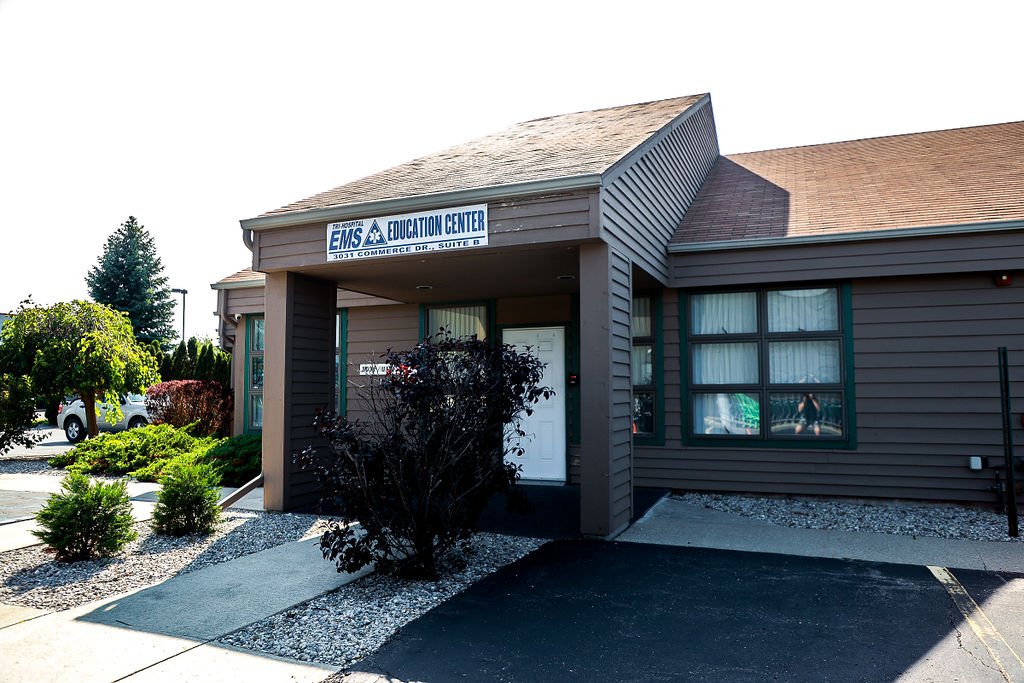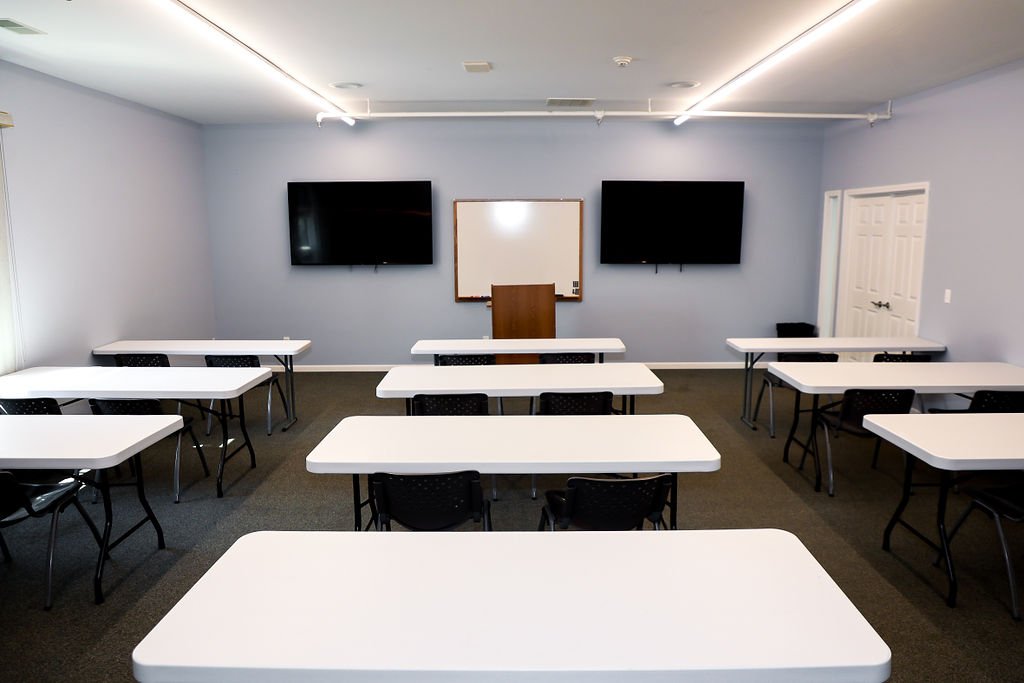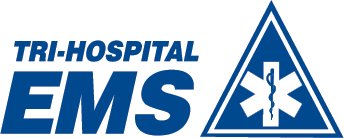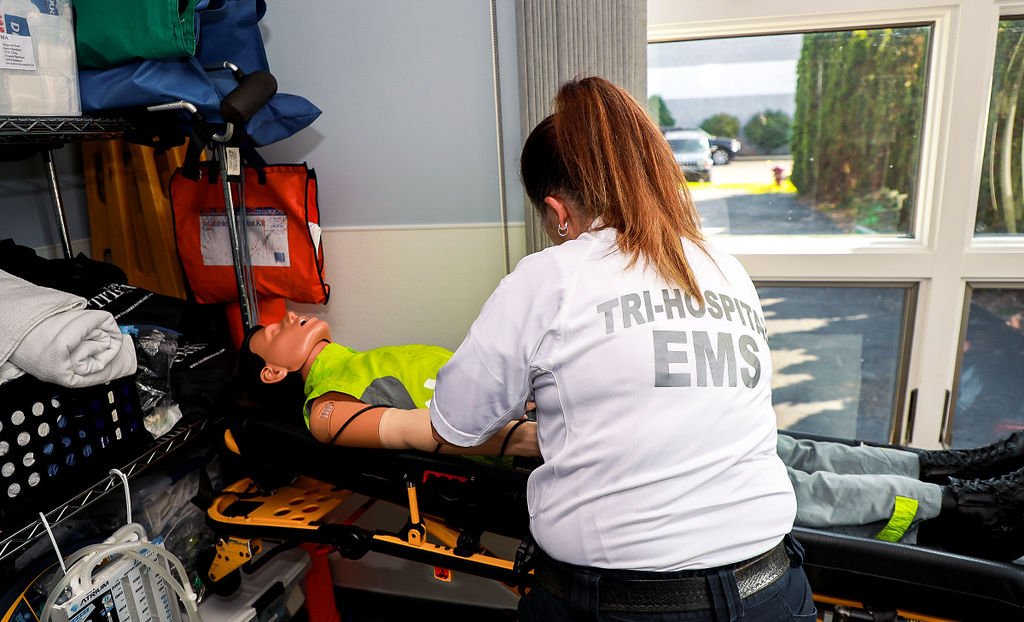
Tri-Hospital Education Center
3031 Commerce Drive, Suite B - Fort Gratiot, Michigan 48059

Upcoming EMT Classes
Cost:$2200.00
Accelerated: January-April 2025. Dates TBD. Classes are Tues/Thurs 9a-5p with occasional Saturday classes.
Seats Available: 0
Accelerated: May-August 2025. Dates TBD. Classes are Tues/Thurs 9a-5p with occasional Saturday classes.
Seats Available: 0
Accelerated: September-December 2025. Dates TBD. Classes are Mon/Wed 9a-5p with occasional Saturday classes.
Seats Available: 15
Traditional: September 2025 through March 2026. Classes are Tues/Thurs 6-10p with occasional Saturday classes 9a-5p.
Seats Available: 20
******************************************
In the event the class is full, you can still have your information added to a wait list. We update on a first come first serve basis. Seats are taken as deposits are paid.
Call 810-985-9876 or email jlum@thems.org for more information or to register.
Click on the class to learn more information about it, or to register!
Upcoming EMR Class
Cost:$ 650.00
Course starts September 2025, and is held at Kimball Twp Fire Department. Classes are Tues/Thurs evening 6-10p with occasional Saturday classes.
Upcoming Paramedic Class
Cost:$ 10,000.00
Course starts September 2025, and is held at the Tri-Hosptial EMS Education Center. Classes are Tues/Thurs 8a-4p.
Call 810-985-9876 or email kbelanger@thems.org for more information or to register.
Currently located in the heart of Fort Gratiot, our education center is where we do most of our education and training. Featuring two classrooms that can be utilized simultaneously, we host a multitude of courses throughout the year.
Using high-fidelity mannequins that give the user instant feedback we can see if a student is falling short of, or hitting the mark to make instant improvements so they can “practice” in a near real-life setting.
Choosing a Career in EMS
Making a career choice is a huge responsibility. Whether you are just graduating from high school, re-entering the work force, or contemplating a new career the decision can be life changing.
A career in EMS can be very rewarding. EMTs & Paramedics often provide care to people in their greatest time of need.
Tri-Hospital EMS has a robust Education Program with multiple ways to get into a career in EMS. Many people are not ready for a five day a week college schedule find that taking courses through our training institute is beneficial. Our classes are designed to fit your lifestyle.
There are two different styles of classes. Our Traditional Fall EMT course is two, four hour, nights per week with an occasional eight hour Saturday. The course runs September through March every year. We also offer a daytime class to cater to individuals that would like an accelerated path to obtaining their EMT license. We run three accelerated courses per year. The accelerated courses are three months in length and classes are held two, eight hour, days each week with an occasional Saturday. If you would like more information on available classes, please contact our Education Center.
Paramedic level training is also offered at our Education Center. The Paramedic course offered starts every September and is roughly 13 months in length. To register for a Paramedic course, an individual must already have obtained their EMT license.

Career Opportunities in the EMS Field
There are various levels of professionals in the field of Emergency Medicine.
A Emergency Medical Responders (EMR) may also be a certified police officer or someone who works in a factory as a training officer. People who work as volunteers on their local Fire Departments may also hold a EMR License.
Basic EMTs, the second level in the EMS System, can work on an ambulance, in a hospital or physician’s office.
Paramedics, the highest level of Pre-Hospital care in the EMS system, have many opportunities to work in Emergency Medicine. Whether it’s on an ambulance, in an ER, or on a helicopter, a Paramedic has a wide set of skills that can offer lifesaving interventions to an individual in their time of need.
Tri-Hospital EMS offers education for all levels mentioned above.
What Does EMS Training Involve?
Depending on the level of education you wish to hold, the training will vary. All training will involve didactic learning in the classroom, as well as learning the psychomotor skills required to do the job within the scope of practice.
-
An EMR student will incur approximately 100 hours of classroom and practical time. Courses are typically two nights per week and require a test with the National Registry to complete their licensure requirements. Students will learn such skills as bandaging, airway management, spinal immobilization, and use of the AED or Automated External Defibrillator.
-
A Basic EMT, which is the minimum level needed to work on an ambulance, requires approximately 240 hours of classroom and practical time. Students will also need to complete clinicals in a hospital and on an ambulance. The minimum number of clinical hours required is 40. Students who take the Basic EMT program will learn everything that is learned in the EMR level as well as more advanced airway management, and some medication administrations.
-
A Paramedic, which is the highest level of prehospital care, requires approximately 1200 hours of classroom and practical time. Students will also need to complete clinicals in a Emergency Room, in the Operating room, an Obstetrics floor, and on an ambulance. The minimum number of clinical hours required is 562. In addition to already having their EMT license and knowing all of those skills, Paramedics will learn advanced airway skills, the use of a cardiac monitor, be able to do life saving maneuvers, and much more.
Continuing Education Classes
-
This course is designed for experienced providers with current BLS and ACLS certification. Participants will be subject to lecture, demonstrations, and discussions of AHA ACLS guidelines.
-
This course is designed for experienced providers in need of stroke certification. Participants will be required to take an online course prior to coming in for a hands on test out following AHA ASLS guidelines. This course has In-Hospital, Pre-Hospital, or Both In-Hospital & Pre-Hospital Tracks.
-
The BLS Instructor Essentials Course is designed to prepare instructor candidates to teach AHA Instructor-led and blended learning BLS Provider courses. It educates instructor candidates on how to use AHA Instructor teaching materials, ensure that students meet learning objectives, offer student coaching skills, provide an objective skills performance evaluation, and follow AHA Instructor and course policies. The course covers core content and discipline-specific content required to teach AHA courses.
-
This is the American Heart Association CPR/AED certification for Healthcare Providers or Basic Life Support (BLS)
-
This course provided through the American Heart Association provides the knowledge and skills that may help save a life. It covers basics of CPR and First Aid, including how to recognize life-threatening emergencies and how to perform lifesaving skills.
-
This course is designed for experienced providers with current BLS and PALS certification. Participants will be subject to lecture, demonstrations, and discussions of AHA PALS guidelines.
Various Continuing Education courses are put on throughout the year in order for Pre-Hospital Providers to renew their license. Most of the CE Classes are free. Keep an eye on the calendar, or contact the Education Center at 810-985-9876 for more information.
COURSES OFFERED AT TRI-HOSPITAL EMS EDUCATION CENTER
-
Designed for kids/teens age 10-18, Our in-person babysitter classes give you access to best-in-class instructors who will share the latest information on child care, offer tips, and can answer all of your questions so that you're ready to start your own babysitting business
-
GEMS provides prehospital EMS providers at all levels with the knowledge and skills to handle the unique medical, social, environmental and communications challenges of the elderly. GEMS gives EMS practitioners the help to improve medical outcomes and quality of life for geriatric patients.
-
NAEMT's Prehospital Trauma Life Support (PHTLS) offers continuing education program for prehospital emergency trauma care for the prehospital care provider; PHTLS courses improve the quality care to a trauma patient while decreasing mortality. The program stresses the treatment of the multi-system trauma using a unique entity with specific needs. PHTLS utilizes critical thinking as the foundation for providing quality care. Based on the belief that, given a good fund of knowledge and key principles, EMS practitioners are capable of making reasoned decisions regarding patient care, PHTLS utilizes the internationally recognized PHTLS textbook and covers the following topics
-
The NRP course is an evidence-based approach to taking care of newborns at birth. It utilizes effective team-based care for healthcare professionals who care for newborns at the time of delivery. NRP is a blended learning approach, it requires online testing, online case-based simulations, and hands-on case-based simulation/debriefing that focus on critical leadership, communication, and team-work skills.
-
PEPP is a complete source of medical information for the Prehospital Care Provider and covers the emergency care of infants and children. PEPP was developed by the American Academy of Pediatrics (AAP), and is an exciting curriculum that is designed to teach prehospital providers how to assess and manage the injured and ill children.
-
In a STOP THE BLEED® course, you’ll learn three quick techniques to help save a life before someone bleeds out: (1) How to use your hands to apply pressure to a wound; (2) How to pack a wound to control bleeding; (3) How to correctly apply a tourniquet. These three techniques will empower you to assist in an emergency and potentially save a life.


